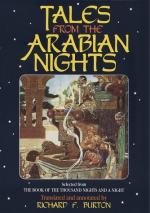[FN#139] Arab. “Rahim” or “Rihm"=womb, uterine relations, pity or sympathy, which may here be meant.
[FN#140] Reciting Fatihahs and so forth, as I have described in the Cemetery of Al-Medinah (ii. 300). Moslems do not pay for prayers to benefit the dead like the majority of Christendom and, according to Calvinistic Wahhabi-ism, their prayers and blessings are of no avail. But the mourner’s heart loathes reason and he prays for his dead instinctively like the so-termed “Protestant.” Amongst the latter, by the bye, I find four great Sommites, (1) Paul of Tarsus who protested against the Hebraism of Peter; (2) Mohammed who protested against the perversions of Christianity; (3) Luther who protested against Italian rule in Germany, and lastly (4) one (who shall be nameless) that protests against the whole business.
[FN#141] Lane transfers this to vol. i. 520 (notes to chapt. vii); and gives a mere abstract as of that preceding.
[FN#142] We learn from Ibn Batutah that it stood South of the Great Mosque and afterwards became the Coppersmiths’ Bazar. The site was known as Al-Khazra (the Green) and the building was destroyed by the Abbasides. See Defremery and Sanguinetti, i. 206.
[FN#143] This great tribe or rather nation has been noticed before (vol. ii. 170). The name means “Strong,” and derives from one Tamim bin Murr of the race of Adnan, nat. circ. A.D. 121. They hold the North-Eastern uplands of Najd, comprising the great desert Al-Dahna and extend to Al-Bahrayn. They are split up into a multitude of clans and septs; and they can boast of producing two famous sectarians. One was Abdullah bin Suffar, head of the Suffriyah; and the other Abdullah bin Ibaz (Ibadh) whence the Ibaziyah heretics of Oman who long included her princes. Mr. Palgrave wrongly writes Abadeeyah and Biadeeyah and my “Bayazi” was an Arab vulgarism used by the Zanzibarians. Dr. Badger rightly prefers Ibaziyah which he writes Ibadhiyah (Hist. of the Imams, etc.).
[FN#144] Governor of Al-Medinah under Mu’awiyah and afterwards (A.H. 64-65=683-4) fourth Ommiade. Al-Siyuti (p. 216) will not account him amongst the princes of the Faithful, holding him a rebel against Al-Zubayr. Ockley makes Ibn al-Zubayr ninth and Marwan tenth Caliph.
[FN#145] The address, without the vocative particle, is more emphatic; and the P.N. Mu’awiyah seems to court the omission.
[FN#146] This may also mean that the 500 were the woman’s “mahr” or marriage dowry and the 250 a present to buy the father’s consent.
[FN#147] Quite true to nature. See an account of the quasi-epileptic fits to which Syrians are subject and by them called Al-Wahtah in “The Inner Life of Syria,” i. 233.
[FN#148] Arab. “Wayha-k” here equivalent to Wayla-k. M. C. Barbier de Meynard renders the first “mon ami” and the second “miserable.”
[FN#149] This is an instance when the article (Al) is correctly used with one proper name and not with another. Al-Kumayt (P. N. of poet) lit. means a bay horse with black points: Nasr is victory.




